Israeli Prime Minister Benjamin Netanyahu signaled impatience on Sunday with disruptions caused by resurgent demonstrations against his judicial overhaul plans, summoning his attorney-general for a cabinet discussion of police counter-measures.
On Monday, Netanyahu's religious-nationalist coalition is due to bring for first parliamentary reading a bill that would limit "reasonableness" as a standard of judicial review - and which critics argue would open the door for abuses of power.
The opposition casts the bill as a step toward curbing judicial independence that would eventually subordinate the Supreme Court to politicians. Netanyahu - who is on trial on graft charges he denies - says the aim is to restore balance among branches of government and rein in court overreach.
The legislation follows the stalling of compromise talks between the government and opposition last month. Street protests that had subsided are flaring anew, with protesters planning to converge on Israel's main airport on Monday.
Raising the stakes, one of Israel's largest shopping-center chains threatened a one-day shutdown if the Knesset vote passes.
In televised remarks before the cabinet session, Netanyahu said it was "unthinkable" that the government would abridge the right to demonstrate or support any violence against protesters.
But he argued such freedom should not be extended to "violations of the law that harm the basic rights of millions of citizens and are taking place on an almost daily basis," citing as examples the disruptions at Ben Gurion Airport, closures of main roads and the heckling of elected officials by protesters.
Attorney-General Gali Baharav-Miara - who has been openly criticized by several cabinet ministers - would be called upon "to give an accounting" at Sunday's meeting, Netanyahu said.
Announcing the plan to shut down all 24 of its malls on Tuesday, Big Shopping Centers called the "reasonableness" bill, if it passes first Knesset reading, a "serious step on the way to clearly illegal governmental corruption, and another step on the way to dictatorship".
"Such legislation would be a fatal blow to Israel's business and economic certainty and would directly and immediately endanger our existence as a leading company in Israel," it added in an open letter.
Shares of Big, which earned a net 130 million shekels ($35 million) in the first quarter, slumped 3.1%. Cabinet minister Itamar Ben-Gvir said he would boycott Big unless it retracted what he deemed political "bullying" by a business.
The furor has stirred fears for Israel's democratic health and dented the economy.
TheMarker financial news site on Sunday estimated a loss to the economy of some 150 billion shekels ($41 billion), citing weaker shares and the shekel, and higher inflation as a result of a more than 5% drop in the shekel versus the dollar that has helped to fuel inflation and overall cost of living.
Last Wednesday, Tel Aviv's outgoing police commander Ami Eshed said he had encountered political intervention by members of Netanyahu's cabinet whom he said wanted excessive force used against anti-government protesters.









